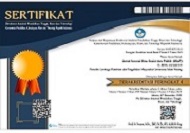Pembangunan Ekonomi Masyarakat Melalui Agrowisata
DOI:
https://doi.org/10.33474/jisop.v2i1.4997Keywords:
economic development, kalaodi agrotourismAbstract
This study is aims to examine the economic development of the Kalaodi community through agrotourism. In particular, this study is aims to examine the development of the agricultural potential of the Kalaodi village as an agro tourist attraction in Tidore City, and home industry development as an effort to improve the community's economy. This research use the desciptive qualitative approach, and the data analysis technique used is an interactive model, with stages: data condensation, display data, drawing/ verifiying. The results showed that the government of Tidore City did not yet have a Kalaodi agrotourism development program. However, the Kalaodi people have developed agriculture as an object of agrotourism. The business carried out by the community is utilizing the house yard as a family garden. In addition, the Kalaodi community has local wisdom in carrying out their profession as a farmer, namely farming that does not damage the forest and nature. This wisdom enriched the Kalaodi village agro tourism. The Kalaodi community also developed a home industry as a form of developing agrotourism in their village. Products of produced from the home industry are malinjo crackers and chips, souvenirs and jewelry and household furniture. Economically, the home industry business developed by the community has an impact on society such as helping the family economy.References
Bento, J. P. C. (2016). Tourism and economic growth in Portugal: an empirical investigation of causal links. Tourism & Management Studies, 12(1), 164–171. https://doi.org/10.18089/tms.2016.12117
Budiarti, T., Suwarto, & Muflikhati, I. (2013). Pengembangan Agrowisata Berbasis Masyarakat Pada Usahatani Terpadu Guna Meningkatkan Kesejahteraan Petani Dan Keberlanjutan Sistem Pertanian. Jurnal Ilmu Pertanian Indonesia, 18(3), 200–207.
Camilleri, M. A. (2018). The Tourism Industry: An Overview. In In Travel Marketing, Tourism Economics and the Airline Product. https://doi.org/10.1007/978-3-319-49849-2_1
Chindris-Vasioiu, O., & Tocan, M. (2015). Sustainable Development in Tourism – Factor of Economic Growth. Knowledge Horizons - Economics, 7(2), 160–164. https://doi.org/https://EconPapers.repec.org/RePEc:khe:journl:v:7:y:2015:i:2:p:160-164
Miles, M. B., Huberman, A. M., & Saldaña., J. (2015). Qualitative Data Analysis: A Methods Sourcebook and The Coding Manual for Qualitative Researchers. Journal Technical Communication Quarterly, 24(1), 381. https://doi.org/10.1080/10572252.2015.975966
Pambudi, S. H., Sunarto, N., & Setyono, P. (2018). Strategi Pengembangan Agrowisata dalam Mendukung Pembangunan Pertanian - Studi Kasus di Desa Wisata Kaligono (Dewi Kano) Kecamatan Kaligesing Kabupaten Purworejo. Analisis Kebijakan Pertanian, 16(2), 159–177. https://doi.org/10.21082/akp.v16n2.2018.165-184
Permana, Y. S. (2010). Kontestasi Abangan-Santri Pasca Orde Baru di Pedesaan Jawa. Jurnal Ilmu Sosial Dan Ilmu Politik, 14(1), 63–82. https://doi.org/10.22146/jsp.10949
Prafitri, G. R., & Damayanti, M. (2016). Kapasitas Kelembagaan Dalam Pengembangan Desa Wisata (Studi Kasus: Desa Wisata Ketenger, Banyumas). Jurnal Pengembangan Kota, 4(1), 76. https://doi.org/10.14710/jpk.4.1.76-86
Pratt, S. (2015). Potential Economic Contribution of Regional Tourism Development in China: A Comparative Analysis. International Journal of Tourism Research, 17(3), 303–312. https://doi.org/10.1002/jtr.1990
Rambodagedara, R. M. M. H. K., Silva, D. A. C. S., & Perera, S. (2015). Agro-Tourism Development in Farming Community : Opportunities and Challenges (D. Hewavitharana (ed.); Issue October). Hector Kobbekaduwa Agrarian Research and Training Institute. https://doi.org/accessed 16/12/2018
Rivai, R. S., & Anugrah, I. S. (2011). Konsep dan Implementasi Pembangunan Pertanian Berkelanjutan di Indonesia. Forum Penelitian Agro Ekonomi, 29(1), 13–25. https://doi.org/10.21082/fae.v29n1.2011.13-25
Rosana, M. (2018). Kebijakan Pembangunan Berkelanjutan Yang Berwawasan Lingkungan di Indonesia. Jurnal KELOLA : Jurnal Ilmu Sosial, 1(1), 148–163. https://doi.org/10.15575/jk.v1i1.4128
Situmorang, M., & Suryawan, I. B. (2017). Tinjauan Potensi Agrowisata Di Kawasan Bedugul. Jurnal Destinasi Pariwisata, 5(1), 160–169. https://doi.org/10.24843/jdepar.2017.v05.i01.p29
Sriyadi, & Francy Risvansuna F. (2015). Model Pengembanganagrowisata Berbasis Kearifan Lokal (Studi Kasus di Desa Kebon Agung Kecamatan Imogiri Kabupaten Bantul Daerah Istimewa Yogyakarta) (Vol. 16, Issue 2). Universitas Muhammadiyah Yogyakarta.
Sudalmi, E. S. (2010). Pembangunan pertanian berkelanjutan. INNOFARM : Jurnal Inovasi Pertanian, 9(2), 15–28. http://ejurnal.unisri.ac.id/index.php/innofarm/article/view/28
Suwena, I. K., & Widyatmaja, I. G. N. (2017). Pengatahuan Ilmu Dasar Pariwisata (Edisi Revi, p. 240). Pustaka Larasan.
Syafira, R. (2017). Strategi Pengembangan Inti Agrowisata Dengan Pendekatan Business Model Canvas. Institut Pertanian Bogor.
Tini, D. L. R. (2019). Pengembangan Program Usaha Ekonomis Produktif dalam Pemberdayaan Perempuan di Kabupaten Sumenep. Jurnal Inovasi Ilmu Sosial Dan Politik (JISoP), 1(2), 148. https://doi.org/10.33474/jisop.v1i2.4801
Yunas, N. S. (2018). Desain Kebijakan Reformasi Sistem Perpajakan Melalui e-Taxation di Indonesia: Belajar Pada Keberhasilan Reformasi Sistem Perpajakan di Jepang. CosmoGov: Jurnal Ilmu Pemerintahan, 4(1), 71–89. https://doi.org/10.24198/cosmogov.v4i1.14214
Downloads
Published
How to Cite
Issue
Section
License
.


_-_Copy.jpg)





